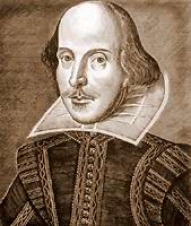Sonnet
normally a fourteen-line iambic pentameter poem. The conventional Italian, or Petrarchan sonnet is rhymed abba, abba, cde, cde; the English, or Shakespearean, sonnet is rhymed abab, cdcd, efef, gg.
Sonnet 105
William Shakespeare
Let not my love be called idolatry,
Nor my belovèd as an idol show,
Since all alike my songs and praises be
To one, of one, still such, and ever so.
Kind is my love today, tomorrow kind,
Still constant in a wondrous excellence;
Therefore my verse to constancy confined,
One thing expressing, leaves out difference.
“Fair, kind, and true” is all my argument,
“Fair, kind, and true” varying to other words;
And in this change is my invention spent,
Three themes in one, which wondrous scope affords.
Fair, kind, and true, have often lived alone.
Which three till now never kept seat in one.
William Shakespeare is famous for his plays and for his sonnets. Sonnet 105, “Let Not My Love Be Called Idolatry”, contains the literary device, simile. The first two lines, “Let not my love be called idolatry, nor my beloved as an idol show”, include the simile. Shakespeare doesn’t want his love for another human to be considered idolatry, nor for his beloved to appear to be like an idol. By using the simile Shakespeare is able to connect the two thoughts into one, with one main theme behind them.

"Virtue is bold, and goodness never fearful." ~William Shakespeare
William Shakespeare

William Shakespeare was born to John Shakespeare and mother Mary Arden some time in late April 1564 in Stratford-upon-Avon. There is no record of his birth, but his baptism was recorded by the church, thus his birthday is assumed to be the 23 of April. His father was a prominent and prosperous alderman in the town of Stratford-upon-Avon, and was later granted a coat of arms by the College of Heralds. All that is known of Shakespeare's youth is that he presumably attended the Stratford Grammar School, and did not proceed to Oxford or Cambridge. The next record we have of him is his marriage to Anne Hathaway in 1582. The next year she bore a daughter for him, Susanna, followed by the twins Judith and Hamnet two years later.
Seven years later Shakespeare is recognized as an actor, poet and playwright, when a rival playwright, Robert Greene, refers to him as "an upstart crow" in A Groatsworth of Wit. A few years later he joined up with one of the most successful acting troupe's in London: The Lord Chamberlain's Men. When, in 1599, the troupe lost the lease of the theatre where they performed, (appropriately called The Theatre) they were wealthy enough to build their own theatre across the Thames, south of London, which they called "The Globe." The new theatre opened in July of 1599, built from the timbers of The Theatre, with the motto "Totus mundus agit histrionem" (A whole world of players) When James I came to the throne (1603) the troupe was designated by the new king as the King's Men (or King's Company). The Letters Patent of the company specifically charged Shakespeare and eight others "freely to use and exercise the art and faculty of playing Comedies, Tragedies, Histories, Inerludes, Morals, Pastorals, stage plays ... as well for recreation of our loving subjects as for our solace and pleasure."
Shakespeare entertained the king and the people for another ten years until June 19, 1613, when a canon fired from the roof of the theatre for a gala performance of Henry VIII set fire to the thatch roof and burned the theatre to the ground. The audience ignored the smoke from the roof at first, being to absorbed in the play, until the flames caught the walls and the fabric of the curtains. Amazingly there were no casualties, and the next spring the company had the theatre "new builded in a far fairer manner than before." Although Shakespeare invested in the rebuilding, he retired from the stage to the Great House of New Place in Statford that he had purchased in 1597, and some considerable land holdings where he continued to write until his death in 1616 on the day of his 52nd birthday.
(http://www.shakespeare-literature.com/)
